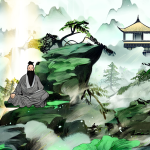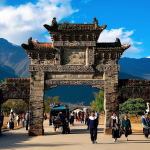《种树郭橐驼传》原文

郭橐驼,不知始何名。病偻,隆然伏行,有类橐驼者,故乡人号之“驼”。驼闻之,曰:“甚善。名我固当。”因舍其名,亦自谓“橐驼”云。
其乡曰丰乐乡,在长安西。驼业种树,凡长安豪富人为观游及卖果者,皆争迎取养。视驼所种树,或移徙,无不活,且硕茂,早实以蕃。他植者虽窥伺效慕,莫能如也。
有问之,对曰:“橐驼非能使木寿且孳也,能顺木之天,以致其性焉尔。凡植木之性,其本欲舒,其培欲平,其土欲故,其筑欲密。既然已,勿动勿虑,去不复顾。其莳也若子,其置也若弃,则其天者全而其性得矣。故吾不害其长而已,非有能硕茂之也;不抑耗其实而已,非有能早而蕃之也。他植者则不然,根拳而土易,其培之也,若不过焉则不及。苟有能反是者,则又爱之太恩,忧之太勤,旦视而暮抚,已去而复顾,甚者爪其肤以验其生枯,摇其本以观其疏密,而木之性日以离矣。虽曰爱之,其实害之;虽曰忧之,其实仇之,故不我若也。吾又何能为哉!”
问者曰:“以子之道,移之官理,可乎?”驼曰:“我知种树而已,官理,非吾业也。然吾居乡,见长人者好烦其令,若甚怜焉,而卒以祸。旦暮吏来而呼曰:‘官命促尔耕,勖尔植,督尔获,早缫而绪,早织而缕,字而幼孩,遂而鸡豚。’鸣鼓而聚之,击木而召之。吾小人辍飧饔以劳吏者,且不得暇,又何以蕃吾生而安吾性耶?故病且怠。若是,则与吾业者其亦有类乎?”
问者曰:“嘻,不亦善夫!吾问养树,得养人术。”传其事以为官戒。
中文翻译
郭橐驼,不知道他起初叫什么名字。他患了脊背弯曲的病,脊背高高突起,弯着腰走路,就像骆驼一样,所以乡里人称呼他叫“驼”。橐驼听说后,说:“这个名字很好啊,这样称呼我确实恰当。”于是他舍弃了他原来的名字,也自称起“橐驼”来。
他的家乡叫丰乐乡,在长安城西边。郭橐驼以种树为职业,凡是长安城里经营园林游览和做水果买卖的豪富人,都争着迎接雇佣他。观察橐驼种的树,有的是移植来的,也没有不成活的;而且长得高大茂盛,结果实早而且多。其他种树的人即使暗中观察、羡慕效仿,也没有谁能比得上。
有人问他种树种得好的原因,他回答说:“我郭橐驼不是能够使树木活得长久而且长得很快,只不过能够顺应树木的天性,来实现其自身的习性罢了。但凡种树的方法,它的树根要舒展,它的培土要平均,它根下的土要用原来培育树苗的土,它捣土要结实。已经这样做了,就不要再动,不要再忧虑它,离开它不再回顾。栽种时要像对待子女一样细心,栽好后要像丢弃它一样放在一边,那么树木的天性就得以保全,它的习性就得以实现。所以我只不过不妨碍它的生长罢了,并不是有能使它长得高大茂盛的办法;只不过不抑制、减少它的结果罢了,也并不是有能使它果实结得早又多的办法。别的种树人却不是这样,树根拳曲又换了生土;他培土的时候,不是过紧就是太松。如果有能够和这种做法相反的人,就又太过于吝惜它们了,担心它太过分了,在早晨去看了,在晚上又去摸摸,已经离开了,又回头去看看。更严重的,甚至用指甲划破树皮来观察它是活着还是枯死了,摇晃树根来看它是否栽结实了,这样树木的天性就一天天远去了。虽然说是喜爱它,这实际上是害了它,虽说是担心它,这实际上是仇视它。所以他们都不如我。我又能做什么呢?”
问的人说:“把你种树的方法,转用到做官治民上,可行吗?”橐驼说:“我只知道种树罢了,做官治民,不是我的职业。但是我住在乡里,看见那些官吏喜欢不断地发号施令,好像是很怜爱(百姓)啊,但百姓最终反因此受到祸害。在早上在晚上那些小吏跑来大喊:‘长官命令:催促你们耕地,勉励你们种植,督促你们收获,早些煮茧抽丝,早些织你们的布,养育你们的小孩,喂大你们的鸡和猪。’一会儿打鼓招聚大家,一会儿鼓梆召集大家。我们这些小百姓停止吃早、晚饭去慰劳那些小吏尚且不得空暇,又怎能使我们繁衍生息,使我们民心安定呢?所以我们既困苦又疲乏,像这样(治民反而扰民),它与我种树的行当大概也有相似的地方吧?”
问的人说:“不也是很好吗!我问种树的方法,得到了治民的方法。”我为这件事作传把它作为官吏们的鉴戒。
英文翻译
Guo Tuotuo, whose original name was unknown. He suffered from a hunchback and walked bent over, looking like a camel. So the villagers called him "Tuotuo". When Tuotuo heard this, he said, "That's a good name. It suits me well." Then he abandoned his original name and also called himself "Tuotuo".
His hometown was Fengle Township, located to the west of Chang'an City. Guo Tuotuo made a living by planting trees. All the wealthy people in Chang'an who managed gardens for sightseeing or sold fruits would compete to welcome and hire him. Looking at the trees planted by Tuotuo, even those that were transplanted would all survive. Moreover, they grew tall and luxuriant, bearing fruits early and abundantly. Other planters, even if they secretly observed and admired his methods, could not match him.
Someone asked him why his trees grew so well. He replied, "I, Guo Tuotuo, am not capable of making trees live long and grow fast. I can merely follow the nature of the trees and bring out their natural characteristics. As for the general principles of planting trees, the roots should be spread out; the soil around the roots should be level; the soil used should be the original soil; and the soil should be packed down firmly. Once these are done, don't move the tree or worry about it anymore. Don't go back to check on it. When planting, treat the tree as if it were your own child; after planting, treat it as if you have abandoned it. In this way, the natural nature of the tree will be preserved, and its natural characteristics will be fully expressed. So I just don't interfere with its growth. It's not that I have a special way to make it grow tall and luxuriant; I just don't suppress or reduce its fruit production. It's not that I have a special way to make it bear fruits early and abundantly. Other planters, however, are different. They bend the roots and change the soil. When they pack the soil, it's either too loose or too tight. If there is anyone who does the opposite, they love the trees too much and worry about them too often. They check on them in the morning and touch them in the evening. After leaving, they come back to check again. Some even scratch the bark with their nails to see if the tree is alive or dead, and shake the trunk to see if the roots are firm. In this way, the natural nature of the tree gradually fades away. Although they say they love the trees, they actually harm them; although they say they worry about the trees, they actually regard them as enemies. That's why they can't match me. What more can I do?"
The questioner said, "Oh, that's wonderful! I asked about tree - planting and got the method of governing the people." He then passed on this story as a warning to officials.
背景补充
创作背景
本文创作于中唐时期。当时唐朝经过安史之乱后,社会矛盾日益尖锐,政治腐败现象严重。地方官吏为了政绩,往往对百姓横征暴敛、频繁扰民,使得百姓生活困苦不堪。柳宗元目睹了这种现象,深感痛心,于是创作了这篇《种树郭橐驼传》,借郭橐驼种树的故事,来讽喻当时的官吏,希望他们能从中吸取教训,改变统治方法,让百姓得以休养生息。
作者简介
柳宗元(773年 - 819年),字子厚,河东郡(今山西运城永济)人,世称“柳河东”“河东先生”。他是唐代杰出的文学家、思想家、哲学家、散文家和诗人,唐宋八大家之一。
柳宗元一生积极参与政治革新运动,与韩愈共同倡导古文运动,并称为“韩柳”。他的文学成就颇高,其散文题材广泛,体裁多样,寓言、山水游记、传记等都有很高的艺术价值。代表作有《永州八记》《捕蛇者说》《封建论》等。他的诗歌也独具特色,风格清峭自然。
文章主旨
《种树郭橐驼传》的主旨是通过讲述郭橐驼种树的高超技艺以及他对于种树原理的阐述,进而类比到官吏治理百姓的问题上。作者借郭橐驼之口指出,种树要顺应树木的自然生长规律,而治理百姓也应该让百姓按照自己的方式生活和发展,官吏不应过度干预和骚扰百姓。文章批判了当时官吏繁政扰民的现象,表达了作者对百姓的同情以及对清明政治的渴望,同时也揭示了一个普遍的道理:无论做什么事情,都要遵循事物的客观规律,不能违背自然和民意。
作品影响
《种树郭橐驼传》是一篇具有深刻思想内涵和独特艺术价值的散文。它在文学史上具有重要地位,不仅以其巧妙的构思和生动的描写展现了作者高超的写作技巧,更以其深刻的社会批判意义和现实启示作用,对后世的文学创作和社会思想产生了深远影响。后世许多文人学者在论述治国理政、为人处世等问题时,常常引用这篇文章中的观点和事例。同时,它也为中国古代寓言体散文的发展做出了重要贡献,成为此类散文的经典之作。












评论功能已关闭。